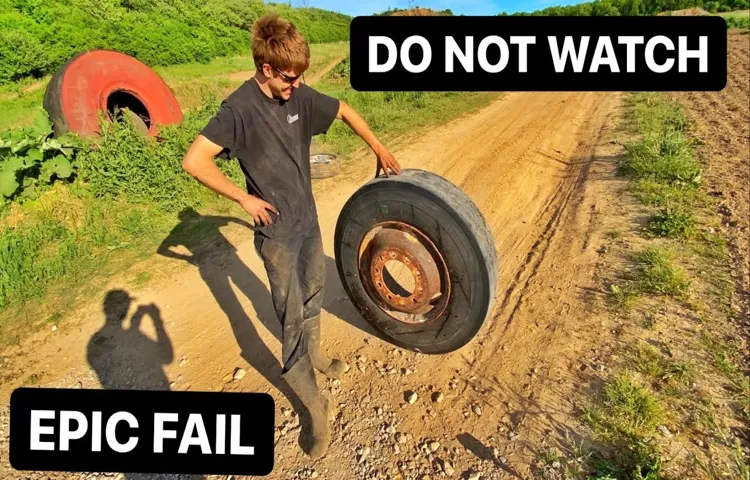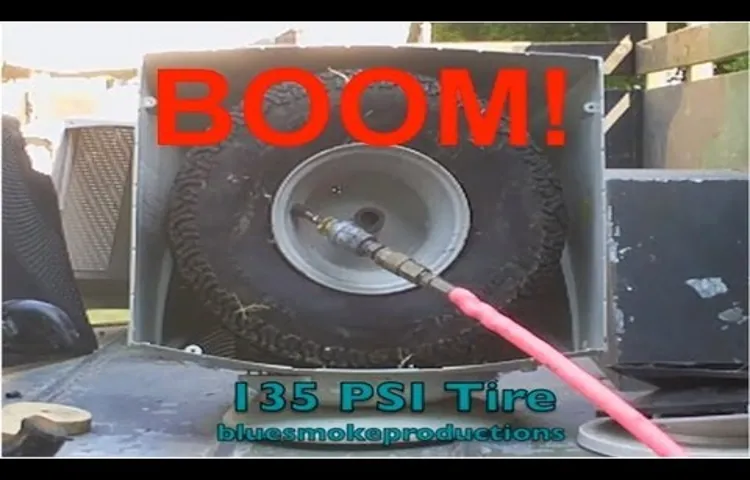When we hit the road, we want to be sure that our tires can handle the journey ahead. However, have you ever wondered when a tire could possibly explode? It’s not a pleasant thought, but it’s one that can’t be ignored. In this detailed analysis, we’ll explore the factors that can cause a tire to burst and how to prevent it from happening.
It’s important to know that a tire could explode at any time – it could happen during a long drive to a summer vacation destination or just on a routine trip to the supermarket. But let’s not worry just yet – we’re going to examine the different reasons for tire explosions to give you a better understanding of the issue and how to keep yourself safe on the road. So buckle up and get ready to dive into the world of tire explosions!
Table of Contents
Understanding Tire Pressure
Have you ever wondered what psi a tire will explode at? Well, the answer is not as straightforward as you might think. Generally speaking, tires are designed to withstand a certain amount of pressure and it varies depending on the type of tire and the vehicle it is used on. Most standard cars require a tire pressure of between 30 and 35 psi, while heavy-duty trucks might require up to 80 psi.
Regardless of the recommended tire pressure, exceeding the maximum psi limit can cause the tire to burst, resulting in a potentially dangerous situation. While it is unlikely to happen under normal circumstances, factors such as overheating, punctures, and wear can also contribute to tire explosions. Therefore, it is important to regularly check your tire pressure and ensure that it is within the recommended range to avoid any untoward incidents.
What is PSI?
If you want your vehicle to perform optimally and achieve better fuel efficiency, it’s essential to understand tire pressure. PSI, or pounds per square inch, is a critical factor in maintaining the health and longevity of your tires. It indicates the amount of air pressure inside your tires and affects various aspects of vehicle safety, including handling, stability, and braking.
Maintaining the recommended PSI can also save you from unexpected blowouts or flat tires while on the road. In general, lower PSI can lead to more excellent grip and smoother ride quality, while higher PSI provides better fuel efficiency and reduces rolling resistance. As a car owner, it’s vital to check your tire pressure regularly and keep them inflated to the recommended levels for optimal performance and safety.
Remember, neglecting tire pressure can have a significant impact on your vehicle’s performance and safety.

Why is Correct Tire Pressure Important?
Tire pressure is an essential aspect of maintaining your vehicle’s health. Understanding tire pressure is crucial because it affects various aspects of your vehicle’s performance, including safety, fuel efficiency, and tire longevity. Low tire pressure can lead to reduced fuel economy because your engine has to work harder, which leads to decreased gas mileage.
In addition, low tire pressure can increase the wear and tear on your tires, leading to shorter tire life and potentially a blowout. On the other hand, overinflated tires can lead to a harsh ride and a decrease in traction, which can affect your vehicle’s handling on wet or slippery roads. Keeping your tire pressure at the manufacturer’s recommended level can provide optimal performance, safety, and longevity.
So, make sure you check your tire pressure regularly to avoid any potential risks on the road.
What Happens When There is Too Much or Too Little Air in Tires?
Understanding the importance of tire pressure is crucial when it comes to driving safely and prolonging the life of your tires. If there is too much air in your tires, this can lead to a bumpy and uncomfortable ride, as well as faster wear and tear on your tires. Additionally, overinflated tires can reduce your vehicle’s stability and increase your risk of hydroplaning in wet conditions.
On the other hand, if there is not enough air in your tires, this can cause your tires to deflect more, making for a sluggish and unresponsive ride. Underinflated tires can also lead to overheating, which can ultimately lead to tire failure. It’s recommended to check your tire pressure regularly and make sure it is at the manufacturer’s recommended level to ensure optimal performance and safety on the road.
When Will Tires Explode?
Have you ever wondered what psi a tire will explode at? Well, the truth is, there is no one-size-fits-all answer to this question. It really depends on a variety of factors, such as the type of tire, the weight of the vehicle, and the temperature outside. In general, most passenger car tires are designed to handle a maximum inflation pressure of around 44 psi.
However, if a tire is overinflated, it can become more susceptible to a blowout or explosion. Additionally, if a tire is underinflated, it can build up heat and eventually fail. So, it’s important to regularly check your tire pressure and make sure it stays within the recommended range.
This can not only prevent potential accidents and damage to your vehicle but also increase the lifespan of your tires.
Factors that Determine When a Tire Explodes
Tire explosions can be hazardous and can cause severe injuries. Several factors can determine when a tire explodes, including the tire’s age, wear and tear, and usage. As tires age, their rubber structure weakens, making them vulnerable to damage from the heat generated during long-distance driving.
Additionally, overloading the tires beyond the recommended capacity can also lead to explosive tire failure. Similarly, under-inflated tires can place excessive strain on the sidewalls, causing internal heat buildup and increasing the risks of a tire blowout. Furthermore, extreme weather conditions, like hot summers or wet and snowy winters, can cause rapid treadwear on tires.
When the rubber wears out, the tire’s structural integrity is weakened, making it susceptible to overloading, under-inflation, and excessive heat buildup. In the end, getting your tires regularly checked for the recommended pressure, alignment, and structural integrity can reduce the risk of tire explosions and keep you safe on the road.
Maximum PSI Rating for Tires
When it comes to the maximum PSI rating for tires, there are a few things you need to keep in mind. While it may be tempting to push your tires to the limit, doing so can be incredibly dangerous. Tires that are inflated beyond their maximum PSI rating can easily explode, causing damage to your vehicle and potentially even injuring you or your passengers.
So when will tires explode? It’s hard to say for sure – it depends on a variety of factors, including the age and condition of the tire, the temperature outside, and the amount of weight the tire is carrying. That’s why it’s important to always check your tire pressure regularly, and to make sure you never overinflate your tires beyond their recommended PSI rating. By taking these steps, you can help keep yourself and others safe on the road and avoid any potential tire explosions.
Remember, it’s always better to err on the side of caution when it comes to tire pressure – your safety depends on it.
Real Life Examples of Tires Exploding due to Incorrect Tire Pressure
Tire Pressure Tires exploding due to incorrect tire pressure can happen anytime, anywhere. It’s not something we often think about, but the consequences of not checking your tire pressure can be catastrophic. One real-life example of this is a case where a truck driver failed to check his tires before a long haul.
As he was driving down the highway, one of his tires exploded, causing the truck to crash and resulting in multiple fatalities. Another example is a driver who ignored her tire pressure warning light and continued to drive on her flat tire until it burst, causing her to lose control of the vehicle. These examples show just how important it is to check your tire pressure regularly and accurately.
Not only can it save you money on fuel costs and prevent tire wear, but it can also potentially save lives. So, make sure you check your tire pressure at least once a month, and always keep an eye out for warning lights. It’s a small task that can make a huge difference.
How to Prevent Tire Explosion
“What PSI will a tire explode?” This is a common question asked by many drivers who want to ensure their safety on the road. The answer is not straightforward as it depends on various factors, such as the type of tire, its age, the weather conditions, and the road surface. However, experts recommend maintaining the recommended tire pressure given by the manufacturer as it helps prevent tire explosion.
Overinflating or underinflating the tire beyond the recommended PSI may cause the tire to blow out unexpectedly, which can be dangerous, especially when driving at high speeds. Therefore, it is vital to check the tire pressure regularly, at least once a month, using a tire pressure gauge, and add or release air accordingly. By doing so, you can ensure your tire’s longevity, improve fuel efficiency, and most importantly, avoid potential tire explosions that could lead to accidents.
How to Check Tire Pressure
Tire explosion can be a serious hazard on the road, and it’s a risk that every driver wants to avoid. One of the key steps to preventing a tire explosion is to regularly check your tire pressure. It’s important to use a reliable tire pressure gauge, as well as to consult your vehicle’s manual for the correct pressure range.
Additionally, you want to make sure that your tires are not overinflated or underinflated, as both can lead to issues on the road. Overinflated tires can be too rigid and increase the risk of a sudden blowout, while underinflated tires cause more friction and can lead to overheating. Ultimately, regular tire maintenance, including checking tire pressure, can go a long way in preventing tire explosions and keeping you safe on the road.
When to Replace Tires
Replacing tires regularly is an essential aspect of car maintenance. The lifespan of a tire depends on many factors such as the frequency of use, distance traveled, type of surface it comes in contact with, and the weather conditions. Once the tread depth reaches 2/32 of an inch, it is time to replace the tire.
However, to avoid tire explosion, it is imperative to monitor the tires’ condition regularly. You should examine the tire for wear and tear, such as uneven tread wear or bulges on the sidewall. Overinflated or underinflated tires can also lead to tire explosion.
Therefore, it is necessary to keep the tire pressure in check and inflate tires as per the manufacturer’s recommended PSI level. Furthermore, avoid overloading your car beyond its intended weight limit. In summary, replacing tires after their useful life expires, checking for wear and tear, maintaining correct tire pressure, and load capacity are the best ways to prevent tire explosion.
Conclusion
In the game of tire pressure, it’s not about how high you can go, but about finding the perfect balance. One thing’s for sure though, if you push too hard and exceed your tire’s maximum psi, you’ll be in for a rather explosive surprise. So, always keep an eye on your tire pressure and don’t let things get too inflated!”
FAQs
1. What is the average psi rating for car tires? A: The average psi rating for car tires is typically between 30-35 psi. 2. Can overinflated tires lead to tire explosions? A: Yes, overinflated tires can lead to tire explosions as the excessive pressure can cause the tire to burst. 3. How long can you safely drive on a tire with low psi? A: It is not safe to drive on a tire with low psi as it can lead to tire damage or blowouts. It is recommended to check tire pressure regularly and inflate as necessary. 4. What are the consequences of driving on underinflated tires? A: Driving on underinflated tires can lead to decreased fuel efficiency, premature tire wear, and increased risk of tire blowouts. 5. What is the maximum psi rating for car tires? A: The maximum psi rating for car tires can vary depending on the make and model of the car. It is recommended to check the owner’s manual or the tire manufacturer’s specifications for the maximum psi rating. 6. What are the signs of overinflated tires? A: Signs of overinflated tires can include excessive wear in the center of the tread, harsh ride, and increased risk of tire blowouts. 7. How often should you check your tire pressure? A: It is recommended to check tire pressure at least once a month and before long trips or heavy loads.



